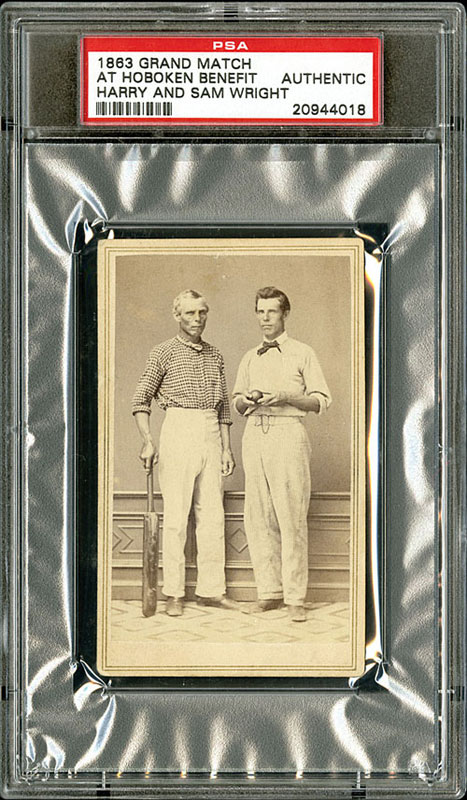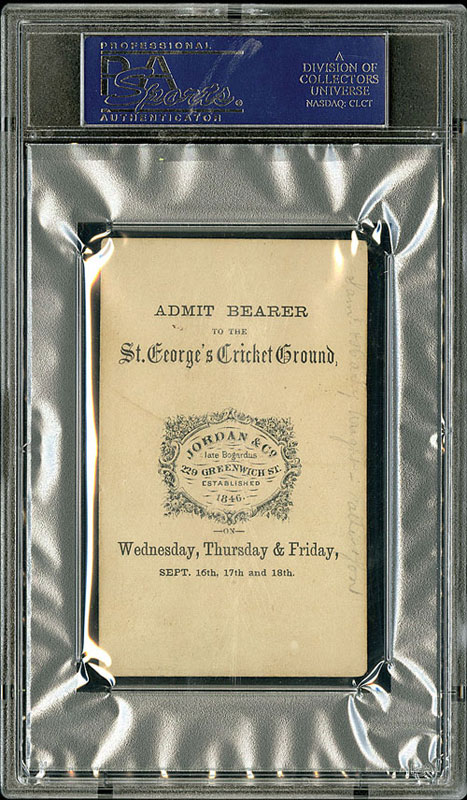Search
1863 Grand Match At Hoboken Benefit Card of Harry and Sam Wright
Sold For:
$32,588
Year: 1863
Auction: 2013 Spring
Lot #: 7
Auction: Featured
Presented is one of the most extraordinary new discoveries we have ever had the privilege of offering: A previously completely unknown 1863 Grand Match At Hoboken Benefit card of Sam Wright and Harry Wright together! The 1863 Grand Match At Hoboken Benefit card set, as detailed extensively in the research and description presented with the 1863 Grand Match At Hoboken Benefit Card of Harry Wright (see previous lot), was created to promote attendance, and the sale of admissions, to a special series of games held in September 1863. The first two games were cricket matches. The third was a baseball game. The significance of the 1863 Grand Match At Hoboken Benefit cards is detailed extensively in the previous lot. In short: The several benefit games of the early 1860s that were organized by Harry Wright were the very first recorded open transactions of players accepting money for playing baseball. These ticket/cards are of enormous historical significance as their production and sale represent not only the very first set of baseball cards ever produced, but their sale also literally represents the Birth of Professional Baseball.
We only recently became aware of the existence of the 1863 Grand Match Benefit card of Harry and Sam Wright by chance while researching the Harry Wright card. It was not in the collection of a nineteenth-century baseball card collector; rather, it was in an extremely advanced non-baseball historical CDV photography collection. Technically one could say it is not a new discovery, as it has been in a collection for decades, but as far as baseball collectors and historians are concerned, it is very much a new and extremely significant discovery. When the front and back images first came to us via email, we practically fell out of our chairs. Not only is this a totally new addition to the 1863 Grand Match At Hoboken set, but the image itself was previously unknown and is totally new to collectors and baseball researchers. To the best of our knowledge, and this includes checking with numerous resources including John Thorn (the official historian for Major League Baseball), nineteenth-century cricket and photography experts, nineteenth-century baseball photo experts, and advanced collectors and scholars, this is a totally undocumented image of Harry Wright and his father, Sam Wright, that has never before been published or seen in modern times. It is interesting to note that this Harry and Sam Wright image bears a slight similarity to another CDV image of Harry and Sam that is very famous and which dates from 1865.
One short-lived mystery that puzzled us upon learning of the card is that it had previously been our understanding that the checklist of players in the 1863 Grand Match At Hoboken Benefit card set, and the precise number of ticket/cards sold of each card, was provided in detail by Harry Wright in his personal ledger books (housed at the New York Public Library), and no "Harry and Sam Wright" card was listed. This mystery was soon solved when further research revealed that Harry Wright's accounting detail in his ledger books had been misinterpreted. Harry Wright's accounting does not, in fact, list who was in the set and how many ticket/cards of each player were sold. Rather, it details how many ticket/cards were personally sold by Hammond, Crossley, Sam Wright (Harry's father), and Harry Wright. These were the three players (Harry Wright, Hammond, and Crossley) plus St. George's Cricket groundskeeper Sam Wright that the benefit games were played for. The beneficiaries of the 1863 Grand Match At Hoboken Benefit games personally sold the ticket/cards, and Harry Wright's ledger provides a detailed accounting of their sales. The detailed records indicate that exactly 47 cards were sold by Hammond, 57 by Crossley, 11 by Sam Wright and 150 by Harry Wright. Exactly how many different images were produced (and thus comprise the set) is not addressed. The Harry and Sam Wright card here is a newly discovered addition to the checklist.
This card of Harry and Sam Wright posing together has a decidedly cricket "look" to it, as can easily be seen, with Sam Wright holding a cricket paddle. This, of course, is entirely appropriate as the first two of the three 1863 Grand Match At Hoboken Benefit games were cricket matches; only the final match was a baseball game. Despite this fact, the card is, as we know, both a significant cricket and a significant baseball piece. This image of Harry and Sam Wright together has an added appeal as it is also important symbolically. The development of cricket and baseball as organized and professional sports in America are inextricably linked. In the early 1860s, cricket was being supplanted by baseball as the more popular outdoor diversion for both men and boys alike, and it was not uncommon at this time for cricket games and baseball games to be played next to each other on public grounds. Today, Harry Wright is universally recognized as the "Father of Professional Baseball" in honor of his role as organizer and manager of the 1869 Red Stockings, baseball's first openly all-professional team. Harry Wright was originally from England, and before his interests turned to baseball he was a star cricket player, like his father. Few realize that Harry Wright's father, Sam Wright, was the premier cricket player of his day in England, and played an extremely significant role in the transition of cricket from an amateur to a professional sport in America. The similarities of the English pastime of cricket to baseball, the English origins of both games, the connection of the two sports in the preprofessional days of baseball in the 1860s, and the father and son Wrights' roles in transitioning their respective sports to professionalism, all combine to give this card a unique and extraordinary historical significance. This photograph of Sam Wright, cricket paddle in hand, standing with his son, American baseball star Harry Wright, captures in a single photograph what is arguably the definitive symbol of the great English influences on baseball and its early development as a professional sport and as America's National Pastime. When this photograph was taken, the game of baseball was still officially an amateur sport, but was quickly evolving to professional status. The advent of professional baseball is intertwined with this very card, for the benefit games organized by Harry Wright in the early 1860s represent the earliest instances in which players were openly paid for playing baseball, and the proceeds from the sale of the 1863 Grand Match At Hoboken Benefit cards (including this very card/ticket!) were used to pay the players including Harry Wright, the future "Father of Professional Baseball."
The card (2.25 x 4 inches) displays a handwritten pencil notation on the reverse reading "Sam & Harry Wright - father and son," and is otherwise in Excellent condition. Encapsulated as Authentic by PSA. Reserve $10,000. Estimate (open). SOLD FOR $32,587.50
We only recently became aware of the existence of the 1863 Grand Match Benefit card of Harry and Sam Wright by chance while researching the Harry Wright card. It was not in the collection of a nineteenth-century baseball card collector; rather, it was in an extremely advanced non-baseball historical CDV photography collection. Technically one could say it is not a new discovery, as it has been in a collection for decades, but as far as baseball collectors and historians are concerned, it is very much a new and extremely significant discovery. When the front and back images first came to us via email, we practically fell out of our chairs. Not only is this a totally new addition to the 1863 Grand Match At Hoboken set, but the image itself was previously unknown and is totally new to collectors and baseball researchers. To the best of our knowledge, and this includes checking with numerous resources including John Thorn (the official historian for Major League Baseball), nineteenth-century cricket and photography experts, nineteenth-century baseball photo experts, and advanced collectors and scholars, this is a totally undocumented image of Harry Wright and his father, Sam Wright, that has never before been published or seen in modern times. It is interesting to note that this Harry and Sam Wright image bears a slight similarity to another CDV image of Harry and Sam that is very famous and which dates from 1865.
One short-lived mystery that puzzled us upon learning of the card is that it had previously been our understanding that the checklist of players in the 1863 Grand Match At Hoboken Benefit card set, and the precise number of ticket/cards sold of each card, was provided in detail by Harry Wright in his personal ledger books (housed at the New York Public Library), and no "Harry and Sam Wright" card was listed. This mystery was soon solved when further research revealed that Harry Wright's accounting detail in his ledger books had been misinterpreted. Harry Wright's accounting does not, in fact, list who was in the set and how many ticket/cards of each player were sold. Rather, it details how many ticket/cards were personally sold by Hammond, Crossley, Sam Wright (Harry's father), and Harry Wright. These were the three players (Harry Wright, Hammond, and Crossley) plus St. George's Cricket groundskeeper Sam Wright that the benefit games were played for. The beneficiaries of the 1863 Grand Match At Hoboken Benefit games personally sold the ticket/cards, and Harry Wright's ledger provides a detailed accounting of their sales. The detailed records indicate that exactly 47 cards were sold by Hammond, 57 by Crossley, 11 by Sam Wright and 150 by Harry Wright. Exactly how many different images were produced (and thus comprise the set) is not addressed. The Harry and Sam Wright card here is a newly discovered addition to the checklist.
This card of Harry and Sam Wright posing together has a decidedly cricket "look" to it, as can easily be seen, with Sam Wright holding a cricket paddle. This, of course, is entirely appropriate as the first two of the three 1863 Grand Match At Hoboken Benefit games were cricket matches; only the final match was a baseball game. Despite this fact, the card is, as we know, both a significant cricket and a significant baseball piece. This image of Harry and Sam Wright together has an added appeal as it is also important symbolically. The development of cricket and baseball as organized and professional sports in America are inextricably linked. In the early 1860s, cricket was being supplanted by baseball as the more popular outdoor diversion for both men and boys alike, and it was not uncommon at this time for cricket games and baseball games to be played next to each other on public grounds. Today, Harry Wright is universally recognized as the "Father of Professional Baseball" in honor of his role as organizer and manager of the 1869 Red Stockings, baseball's first openly all-professional team. Harry Wright was originally from England, and before his interests turned to baseball he was a star cricket player, like his father. Few realize that Harry Wright's father, Sam Wright, was the premier cricket player of his day in England, and played an extremely significant role in the transition of cricket from an amateur to a professional sport in America. The similarities of the English pastime of cricket to baseball, the English origins of both games, the connection of the two sports in the preprofessional days of baseball in the 1860s, and the father and son Wrights' roles in transitioning their respective sports to professionalism, all combine to give this card a unique and extraordinary historical significance. This photograph of Sam Wright, cricket paddle in hand, standing with his son, American baseball star Harry Wright, captures in a single photograph what is arguably the definitive symbol of the great English influences on baseball and its early development as a professional sport and as America's National Pastime. When this photograph was taken, the game of baseball was still officially an amateur sport, but was quickly evolving to professional status. The advent of professional baseball is intertwined with this very card, for the benefit games organized by Harry Wright in the early 1860s represent the earliest instances in which players were openly paid for playing baseball, and the proceeds from the sale of the 1863 Grand Match At Hoboken Benefit cards (including this very card/ticket!) were used to pay the players including Harry Wright, the future "Father of Professional Baseball."
The card (2.25 x 4 inches) displays a handwritten pencil notation on the reverse reading "Sam & Harry Wright - father and son," and is otherwise in Excellent condition. Encapsulated as Authentic by PSA. Reserve $10,000. Estimate (open). SOLD FOR $32,587.50


